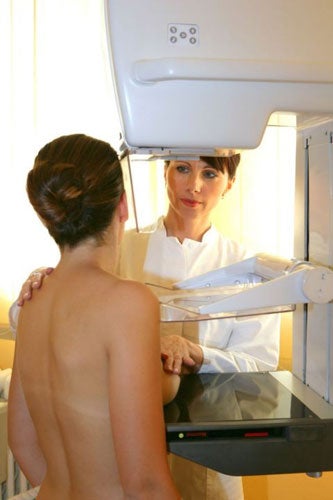Threat to breast cancer testing after controversial patent ruling
Warning that American company's victory could make procedure more expensive

Your support helps us to tell the story
From reproductive rights to climate change to Big Tech, The Independent is on the ground when the story is developing. Whether it's investigating the financials of Elon Musk's pro-Trump PAC or producing our latest documentary, 'The A Word', which shines a light on the American women fighting for reproductive rights, we know how important it is to parse out the facts from the messaging.
At such a critical moment in US history, we need reporters on the ground. Your donation allows us to keep sending journalists to speak to both sides of the story.
The Independent is trusted by Americans across the entire political spectrum. And unlike many other quality news outlets, we choose not to lock Americans out of our reporting and analysis with paywalls. We believe quality journalism should be available to everyone, paid for by those who can afford it.
Your support makes all the difference.Testing for breast cancer could become more difficult and expensive to carry out following a controversial ruling by the European Patent Office that has given an American company rights over a key test for breast cancer.
In a long-running dispute over a test based on the breast cancer gene BRCA1, the European Patent Office ruled in favour of giving Myriad Genetics intellectual property rights over its test for some of the genetic mutations that can lead to breast cancer.
Although the ruling has not given Myriad all the rights it originally applied for, senior clinical geneticists believe that the decision may allow the company to claim royalties for tests developed by other scientists – and as a result lead to fewer tests.
"The fact is these tests are being done and I would very much regret it if they stopped because Myriad put cease-and-desist orders on them. They could do that. We've always been looking over our shoulders to see if Myriad is coming," said Dr Rob Elles, chairman of the British Society for Human Genetics.
About 13 per cent of women develop breast cancer but if they have inherited a faulty version of the BRCA1 gene their risk can jump to 85 per cent.
If women test positive for a BRCA1 mutation they can be offered prophylactic surgery to remove the breast tissue that is at risk A negative result usually means they have a normal risk of breast cancer.
The patent office's ruling has given Myriad rights over two mutations that are frequently detected in Ashkenazi Jews, which means that any genetics centre that uses the BRCA1 test – even if it developed its own test – will have to take this into consideration.
Professor Gert Matthijs, a human geneticist at the University of Leuven in Belgium, said that the ruling means that Myriad could in principle claim infringement of its patent even if a doctor is merely trying to find out what sort of BRCA1 mutation a woman has inherited. He said the issuing of the BRCA1 gene patent to Myriad in 2001 led to a monopoly that was bad for medicine because it dissuaded other companies from developing rival tests.
A spokesman for Myriad Genetics said: "It is important for us to point out that research activities with the patented technologies are not limited in any way by Myriad and are encouraged through subsidised costs for testing from the company to researchers."
Sarah Rawlings, head of policy at Breakthrough Breast Cancer, said she hoped the patent decision would not negatively impact on genetic testing services currently available in the UK.
Join our commenting forum
Join thought-provoking conversations, follow other Independent readers and see their replies
Comments